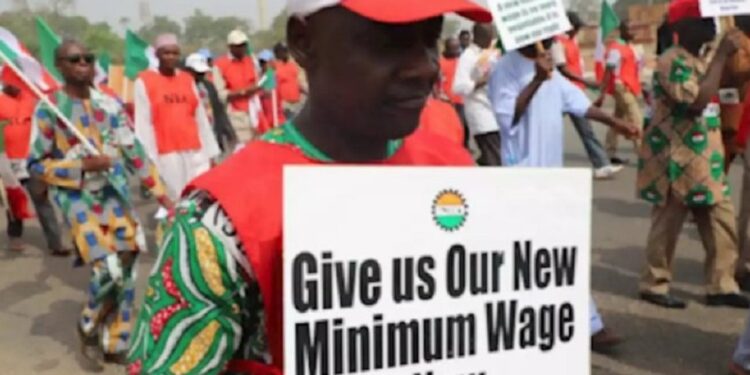The Nigeria Labour Congress (NLC) has opposed the call by some politicians for decentralizing minimum wage negotiations allowing states to have different minimum wages.
In an interview with the News Agency of Nigeria (NAN) on Sunday in Ibadan, the Secretary of NLC in Oyo State, Mr. Adebayo Aribatise, stated that decentralizing minimum wage negotiations would disadvantage workers in some states.
Explaining the broader implications of a centralized minimum wage, Fayemi noted that only a small percentage of the population benefits directly from minimum wage negotiations.
However, Aribatise strongly opposed decentralizing minimum wage negotiations, stating that it is not ideal for the country.
He pointed out that some states have not yet fully implemented the old N30,000 minimum wage despite the efforts of the NLC at both the national and state levels.
He said, “The fact remains that the law binds states to pay national minimum wage. It is expected that the federal government will continue to set the minimum wage. If not, some governors will continue to do as they like.”
“Some governors will bastardise the agreement if we allow it and junior workers will continue to earn nothing worthwhile,”
Backstory
Former Ekiti State Governor, Dr. Kayode Fayemi, had earlier emphasized the need for states to conduct wage negotiations with their labour unions independently from the Federal Government.
Fayemi explained that the position of the Nigerian Governors’ Forum, which he once chaired, was that states should be allowed to negotiate with their labour unions separately, as “fingers are not equal.”
What you should know
The negotiation for a new minimum wage has lingered on in the past months due to the difficulty of different stakeholders in reaching a consensus.
While the federal government and the private sector have agreed on a new minimum wage of N62,000, organised labour led by the Nigerian Labour Congress (NLC) and Trade Union Congress (TUC) are proposing N250,000.
According to organised labour groups, a N62,000 minimum wage is not enough for the average worker in light of the significant increase in the cost of goods and services across the nation.
The federal government had earlier stated that it cannot sustain the proposed minimum wage by organised labour which would amount to around N19 trillion yearly.
On the other hand, the private sector led by NECA had also complained that it cannot meet the demands of labour unions now or any time soon stating the goal of the tripartite committee is to focus on job creation.
The negotiation for a new minimum wage has been thorny leading to strike action that nearly crippled the economy with the shutting down of the national grid.












